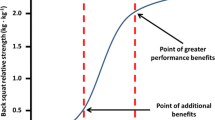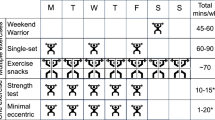Summary
Physical exercise is increasingly being advocated as a means to maintain and enhance good mental health. In general, findings from research indicate that exercise is associated with improvements in mental health including mood state and self-esteem, although a causal link has not been established. Research on acute exercise indicates that 20 to 40 minutes of aerobic activity results in improvements in state anxiety and mood that persist for several hours. These transitory changes in mood occur in both individuals with normal or elevated levels of anxiety, but appear to be limited to aerobic forms of exercise.
In the case of long term exercise programmes, improvements in the mental health of ‘normal’ individuals are either modest in magnitude or do not occur, whereas the changes for those with elevated anxiety or depression are more pronounced. Evidence from studies involving clinical samples indicates that the psychological benefits associated with exercise are comparable to gains found with standard forms of psychotherapy. Hence, for healthy individuals the principal psychological benefit of exercise may be that of prevention, whereas in those suffering from mild to moderate emotional illness exercise may function as a means of treatment.
Exercise may also result in detrimental changes in mental health. Some individuals can become overly dependent on physical activity and exercise to an excessive degree. This abuse of exercise can result in disturbances in mood and worsened physical health. In the case of athletes the intense training, or overtraining, necessary for endurance sports consistently results in increased mood disturbance. Extreme cases of overtraining may result in the staleness syndrome; a condition associated with deteriorating performance and behavioural disturbances including clinical depression.
Exercise can result in either beneficial or detrimental changes in mental health, and the outcome appears to be largely dependent on the ‘dosage’ employed. Although recent studies have provided promising findings regarding the efficacy of exercise in clinical samples, additional research is clearly needed. The influence of various programmatic aspects of exercise (i.e., mode, duration, frequency, intensity, setting) on changes in mental health have not been systematically investigated, and the proposed mechanisms by which exercise acts to affect mental health remain largely unsubstantiated.
Similar content being viewed by others
References
Bahrke MS, Morgan WP. Anxiety reduction following exercise and meditation. Cognitive Therapy and Research 2: 323–333, 1979
Barlow DH. Anxiety and its disorders: the nature and treatment of anxiety and panic, pp. 131–135, Guilford Press. New York, 1988
Barron JL, Noakes TD, Levy W, Smith C, Millar RP. Hypothalamic dysfunction in overtrained athletes. Journal of Clinical Endocrinology and Metabolism 60: 803–806, 1985
Beaumont G. Adverse effects of tricyclic and non-tricyclic antidepressants. International Clinical Psychopharmacology 3: 55–61, 1988
Dishman RK. Medical psychology in exercise and sport. Medical Clinics of North America 69: 123–143, 1985
Greist JH. Exercise intervention with depressed outpatients. In Morgan & Goldston (Eds) exercise and mental health, Hemisphere, Washington, DC, 1987
Greist JH, Klein MH, Eischens RR, Faris J, Gurman AS, et al. Running as treatment for depression. Comparative Psychiatry 21: 611–619, 1979
Grosz HJ, Farmer BB. Blood lactate in the development of anxiety symptoms. Archives of General Psychiatry 21: 611–619, 1969
Guttmann MC, Pollock ML, Foster C, Schmidt D. Training stress in Olympic speed skaters: a psychological perspective. Physician and Sportsmedicine 12: 45–57, 1984
Hannum SM, Kasch FW. Acute post exercise blood pressure response of hypertensive and normotensive men. Scandinavian Journal of Sports Science 3: 11–15, 1981
Katz JL. Long-distance running, anorexia nervosa, and bulimia: a report of two case studies. Comprehensive Psychiatry 27: 74–78, 1986
Koltyn K, Raglin JS, O’Connor PJ, Morgan WP. State anxiety and blood pressure following weight training. Medicine and Science in Sports and Exercise 20: 595, 1988
Kostrubala T. Running and psychotherapy. In Fuenning et al. (Eds) Physical fitness and mental health: proceedings of the research seminar on physical fitness and mental health, University of Nebraska Foundation, Lincoln, NE, 1981
Kuyler PL, Dunner DL. Psychiatric disorders and the need for mental health services among a sample of orthopedic inpatients. Comprehensive Psychiatry 17: 395–400, 1976
Little JC. Neurotic illness in fitness fanatics. Psychiatric Annals 9: 49–56, 1969
Martinsen EW. Exercise and medication in the psychiatric patient. In Morgan & Goldston (Eds), Exercise and mental health, Hemisphere, Washington, DC, 1987
Martinsen EW. Benefits of exercise for the treatment of depression Sports Medicine 9: 380–389, 1990
Martinsen EW, Hoffart A, Solberg O. Aerobic and non-aerobic forms of exercise in the treatment of anxiety disorders. Stress Medicine 5: 115–120, 1989
Morgan WP. Anxiety reduction following acute physical activity. Psychiatric Annals 9: 36–45, 1979
Morgan WP. Physical activity and mental health. In Echert & Montoye (Eds) Exercise and health, Human Kinetics, Champaign, IL, 1984
Morgan WP. Affective beneficience of vigorous physical activity. Medicine and Science in Sports and Exercise 17: 94–100, 1985
Morgan WP, Brown DR, Raglin JS, O’Connor PJ, Ellickson KA. Psychological monitoring of overtraining and staleness. British Journal of Sports Medicine 21: 107–114, 1987a
Morgan WP, Costill DL, Flynn MG, Raglin JS, O’Connor PJ. Mood disturbance following increased training in swimmers. Medicine and Science in Sports and Exercise 20: 408–414, 1988
Morgan WP, Goldston SE. Exercise and mental health, Hemisphere, Washington DC, 1987
Morgan WP, Horstman DH, Cymerman A, Stokes J. Exercise as a relaxation technique. Primary Cardiology 6: 48–57, 1980
Morgan WP, O’Connor PJ. Exercise and mental health. In Dishman (Ed.) Exercise adherence: its impact on public health, pp. 91–121, Human Kinetics, Champaign IL, 1988
Morgan WP, O’Connor PJ. Psychological effects of exercise and sports. In Ryan & Allman (Eds) Sports medicine, pp. 671–689, Academic Press, New York, 1989
Morgan WP, O’Connor PJ, Koltyn KF. Psychological benefits of physical activity through the life span: methodological issues. Proceedings of the World Congress on Movement and Sport, Jyvaskyla, Finland, in press, 1990
Morgan WP, O’Connor PJ, Sparling PB, Pate RR. Psychologic characterization of the elite female distance runner. International Journal of Sports Medicine 8: 124–131, 1987b
Morgan WP, Roberts JA, Brand FR, Feinerman AD. Psychological effect of chronic physical activity. Medicine and Science in Sports 2: 213–217, 1970
O’Connor PJ, Morgan WP, Raglin JS, Barksdale CN, Kalin NH. Mood state and salivary cortisol levels following overtraining in female swimmers. Psychoneuroendocrinology 14: 303–310, 1989
Pitts Jr FN, McClure Jr JN. Lactate metabolism in anxiety neurosis. New England Journal of Medicine 277: 1329–1336, 1967
Raglin JS, Morgan WP. Influence of vigorous exercise on mood state. Behaviour Therapist 8: 179–183, 1985
Raglin JS, Morgan WP. Influence of exercise and quiet rest on state anxiety and blood pressure. Medicine and Science in Sports and Exercise 19: 456–483, 1987
Raglin JS, Morgan WP, Luchsinger A. Mood and self-motivation in successful and unsuccessful female rowers. Medicine and Science in Sports and Exercise, in press, 1990
Regier DA, Boyd JH, Burke JD, Rae DS, Myers JK, et al. One-month prevalence of mental disorders in the United States. Archives of General Psychiatry 45: 977–986, 1988
Ryan AJ. Overtraining of athletes: a round table. Physician and Sportsmedicine 11: 93–110, 1983
Solomon RL. The opponent-process of acquired motivation. American Psychologist 35: 691–712, 1980
Sonstroem RJ. Exercise and self-esteem. In Terjung (Ed.) Exercise and sports sciences reviews 12, pp. 123–155, Collamore Press, Lexington, MA, 1984
Sonstroem RJ, Morgan WP. Exercise and self-esteem rationale and model. Medicine and Science in Sports and Exercise 21: 329–337, 1989
Spielberger CD, Gorsuch RL, Luschene R. State-trait anxiety inventory manual, Consulting Psychologists Press, Palo Alto, 1970
Yates A, Leehey K, Slisslak CM. Running-an analogue of anorexia? New England Journal of Medicine 308: 251–255, 1983
Author information
Authors and Affiliations
Rights and permissions
About this article
Cite this article
Raglin, J.S. Exercise and Mental Health. Sports Med 9, 323–329 (1990). https://doi.org/10.2165/00007256-199009060-00001
Published:
Issue Date:
DOI: https://doi.org/10.2165/00007256-199009060-00001




